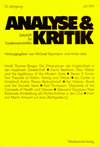ohne Titel

1995 (17) Issue 2
Table of Contents
Title: Überlegungen zur Organtransplantation
Author: Ernesto Garzón Valdés
Page: 118-148
Abstract: Recent advances in medical technology, notwithstanding their potential blessings, have engendered a number of new ethical problems. Questions raised by rapidly improving techniques for the transplantation of human organs and body tissues have become especially urgent, The article tries to clarify and evaluate the main arguments advanced for and against different arrangements in this area. The first part concentrates on the problem of acquisition. The ethical status of eight ways of obtaining human body parts is investigated. The cases are derived from combinations of three criteria: whether the donor consents or not; whether or not he/she is alive or dead at the time of extraction; and whether or not donors (or their heirs) are compensated. In the second part, the problem of adjudication is treated. Three possible arrangements are examined: market, organ bank, and club.
Title: Kommunitaristische Paradoxe
Author: Eduardo Rivera-López
Page: 149-166
Abstract: Two basic kinds of communitarians are discriminated. ,Weak communitarians, reject only the liberal metaethical theses that I call ,universalism, and ,neutralism,, but endorse liberal norms and institutions at the normative level. ,Strong communitarians, condemn liberalism at both levels: they reject not only universalism and neutralism, but also substantive liberal norms defending communitarian values (family, tradition, solidarity etc.). This article intends to show certain internal paradoxes of these two versions of communitarianism.
Title: Rational Choice Fundierungen von Gerechtigkeitsprinzipien
Author: Johannes Schmidt
Page: 167-182
Abstract: The paper draws on a conceptual analysis of rational choice justifications of conceptions of justice. It is argued that the concept of justice can be reduced to two independent moral dimensions. From this conceptual thesis a simple conceptional criterion is derived which any powerful theory of rational choice theories of justice. It is shown that there is but one variant of the rational choice approach which in substantiating principles of justice does not violate this criterion.
Title: Eine globale Rohstoffdividende
Author: Thomas W. Pogge
Page: 183-208
Abstract: We live in a world of radical inequality: Hundreds of millions suffer severe, lifelong poverty. Many others are quite well off and affluent enough significally to improve the lives of the global poor. Does this radical inequality constitute an injustice which we are involved? An affirmative answer finds broad support in different strands of the Western moral tradition, which also support the same program of institutional reform. This reform centers around a Global Resources Dividend, or GRD. A GRD in the amount of one percent of the global social product would raise some $300 Billion a year. This amount is too small to lead to economic dislocation. But it is large enough to eradicate global poverty within one or two decades.
Title: Zur ökonomischen Analyse moralkonformen Handelns
Author: Martin Leschke
Page: 209-231
Abstract: This article deals with general features of moral behaviour from an economic perspective. Moral rules act as an enforcement mechanism replacing external sanctions with internal emotional sanctions such as guilt and shame. It is shown in many experiments and real life situations that morals influence the decision-making process and the outcomes. Moral attitudes help to overcome social dilemma situations if the actors' intrinsic motivation is relatively high and if these moral attitudes are wide-spread. It is argued that to reject the moral dimension means to restrict the relevance of economic theory. This paper emphasizes the importance of moral behaviour and offers a simple model of the effects of morality.
Title: Steiner, s Trilemma. A Critical Comment on Hillel Steiner's "Rational Rights"
Author: Eduardo Rivera-López
Page: 232-235
Abstract: I try to show that Steiner's theory has very implausible normative consequences since it does not accept the prima facie character or rights. This theory is unable to solve the conflicts of interests in which the only intuitively plausible solution consists in overriding someone's rights.